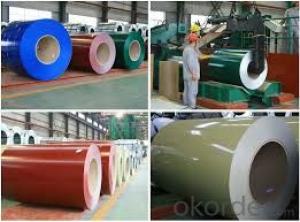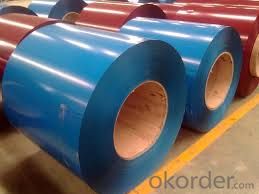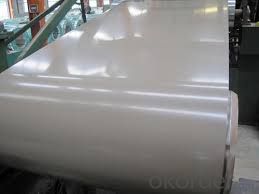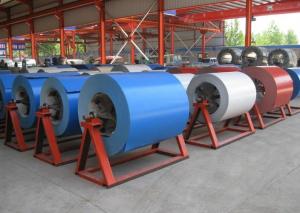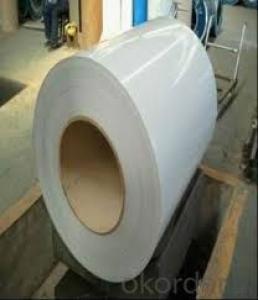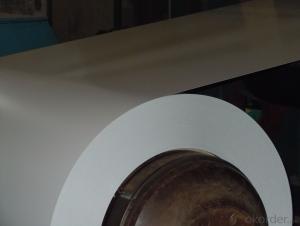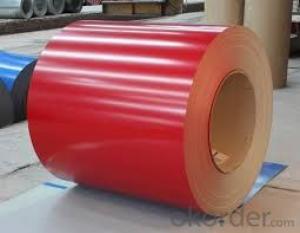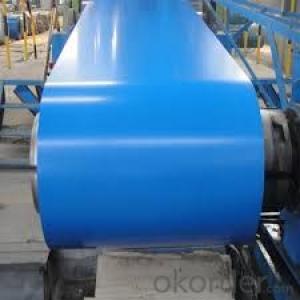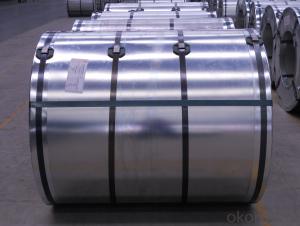Prepainted Galvanized Steel with Zinc Coated/Cold Steel Rolled
- Loading Port:
- Shanghai
- Payment Terms:
- TT OR LC
- Min Order Qty:
- 20 m.t.
- Supply Capability:
- 10000 m.t./month
OKorder Service Pledge
OKorder Financial Service
You Might Also Like
Product Description
Color Coated Galvanzied Steel
1, Grade: SGCC, PPGI CGCC, SGLCC
2, Width: 800-1250mm
3, Thickness: 0.3-1.0mm
4, Color: ALL RAL
* Base Material: Al-Zn Galvanized Steel Coil. SGLCC
* Top side: 15-25 microns primer microns polyester.
* Back side: 5-8 microns primer epoxy.
* Width: 800-1, 250mm
* Thickness: 0.3 -1.0mm Thickness tolerance: +/- 0.02mm
* Al-Zn coating: 30-150g /sq. M. Or can be provided as clients' requirements
* Color: All RAL colour is available or customer supplying the sample
* Inner diameter of coil: 508mm&610mm.
* Packing: Standard seaworthy packing or according to user's need.
* Weight of each coil: 9 tons max
* Guarantee/ warranty
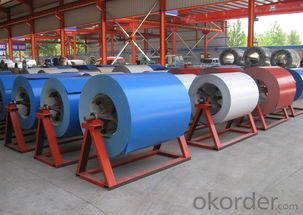
Usage
1. Used as roof panel, wall panel in steel structure in warehouse, factories, exibition hall container houses, cold storage,
2. It is also mainly used in light industry, automobile, construction, animal husbandry, fishery and commerce, etc.
Packing
1. Metal band strapping
2. Outside diameter ring
3. Label
4. Protective steel sheet
5. Water and rustproof paper
6. Steel sheet
Q&A Do you accept OA payment terms?
ANSWER: Yes, sure, but it normally depending on the order value
- Q: steel bollard poles?
- They're short steel posts that are used as a barrier to keep traffic out of an area. If you want to see an example Google it and look at the pics.
- Q: What are the common uses of stainless steel coils?
- Stainless steel coils are commonly used in various industries such as automotive, construction, manufacturing, and food processing. They are utilized for making a wide range of products including kitchen appliances, metal containers, piping systems, heat exchangers, and architectural components. The high corrosion resistance, durability, and aesthetic appeal of stainless steel make it an ideal material for these applications.
- Q: what are the properties that can strengthen the steel to withstand earhquake?
- Well, its not necessary how strong steel is but how buildings are designed that withstands earthquakes. Steel as a property has to elastic qualities and when earthquakes are initiated but moving of the plates, the building has to absorbed the effects of the earth movements while remain standing. This does not necessary mean that the building will be usable afterward but it has to remain standing. Now, how does a building remain standing? All building have within its design a VLLRS (vertical lateral load resisting system). This system is basically designed to resist earthquake loads as well as wind loads. In steel buildings, this system is usual made of OMF (Ordinary moment frames) or braced frames. These frames act to absorb the lateral loads and transmit them into the foundation below. If the structure was concrete, there would still be moment frames made of concrete and steel but you know that concrete has a elasticity that is less than steel. ALthough there elasticity is less, they are stiffer and concrete structure tend to resist more lateral load because of it. In concrete, we can create shear walls which are basically walls that are thick and wide to resist lateral load from earthquake and wind. Masonry has even a lesser strength than steel or concrete and wood even less than above. What makes them usful is how they are used to resist earthquake loads or lateral loads from earthquake and wind. So, to answer your question, its not nessary how strong the steel is but how the material is used to resist earthquake is what is important.
- Q: Why is the selection of steel building erector of extreme importance while starting a new steel building project?
- Because if the beaming is screwed up, everything in the building is at risk. Also, if the erector runs late, everything else is delayed. An incompetent erector can actually cause damage to the beams [especially if inadequate bracing leads to collapse] and getting new ones can severely delay the project.
- Q: What are the different coil packaging machine configurations used for steel coils?
- There are various coil packaging machine configurations utilized for steel coils, each tailored to specific coil sizes, weights, and packaging needs. 1. The horizontal coil packaging machine is designed for smaller steel coils. It is typically equipped with a conveyor system that transports the coil horizontally throughout the packaging process. It may incorporate automatic coil centering, wrapping, and strapping features to guarantee secure and efficient packaging. 2. The vertical coil packaging machine is suitable for larger and heavier steel coils. It is designed to package coils in a vertical position and often includes a rotating arm or turntable for wrapping and securing the coil with strapping. Vertical machines have a higher throughput capacity and can handle coils of various sizes and weights. 3. The ring coil packaging machine is specifically designed for large and heavy steel coils. It comprises a rotating ring structure that surrounds the coil and moves up and down while wrapping and securing it with stretch film or other packaging material. Ring coil packaging machines are versatile, accommodating coils of different diameters and weights, making them suitable for various coil packaging requirements. 4. The eye-to-sky coil packaging machine is intended for steel coils that need to be packaged in an eye-to-sky orientation. It typically features a wrapping station that rotates the coil while applying stretch film or other packaging material. This configuration ensures proper protection and stability during transportation and storage. 5. The eye-to-horizontal coil packaging machine is designed for steel coils that need to be packaged in an eye-to-horizontal orientation. It includes a conveyor system that transports the coil horizontally while applying stretch film or other packaging material. Eye-to-horizontal machines can handle coils of different sizes and are designed to provide secure packaging for easy handling. In conclusion, the choice of coil packaging machine configuration depends on factors such as coil size, weight, packaging requirements, and production throughput. Different configurations offer distinct features and capabilities to ensure efficient and secure packaging of steel coils.
- Q: What are the common coil coating methods?
- The common coil coating methods include roll coating, curtain coating, and spray coating.
- Q: How are steel coils used in the manufacturing of packaging materials?
- Steel coils are often used in the manufacturing of packaging materials such as cans, drums, and metal sheets. These coils are unwound and processed through various machines to form the desired shape and size of the packaging material. The steel coils provide strength, durability, and a protective barrier, ensuring the safety and preservation of the packaged goods.
- Q: How are steel coils used in the manufacturing of electrical components?
- Steel coils are used in the manufacturing of electrical components as they provide a strong and reliable core for various types of transformers and inductors. These coils are often wound around a steel core to enhance magnetic properties and improve efficiency, allowing for the transformation and transfer of electrical energy.
- Q: What are the common uses of cold rolled steel coils?
- Cold rolled steel coils have a wide range of common uses such as in automotive manufacturing, construction, appliances, furniture, and general engineering applications.
- Q: How are steel coils used in the manufacturing of construction bulldozers?
- Steel coils are used in the manufacturing of construction bulldozers to create the main structural components, such as the chassis and the blade, which require the strength and durability that steel provides. The coils are processed and shaped into the desired parts through cutting, bending, and welding techniques, ensuring the bulldozers can withstand heavy loads and harsh working conditions on construction sites.
Send your message to us
Prepainted Galvanized Steel with Zinc Coated/Cold Steel Rolled
- Loading Port:
- Shanghai
- Payment Terms:
- TT OR LC
- Min Order Qty:
- 20 m.t.
- Supply Capability:
- 10000 m.t./month
OKorder Service Pledge
OKorder Financial Service
Similar products
Hot products
Hot Searches
Related keywords
